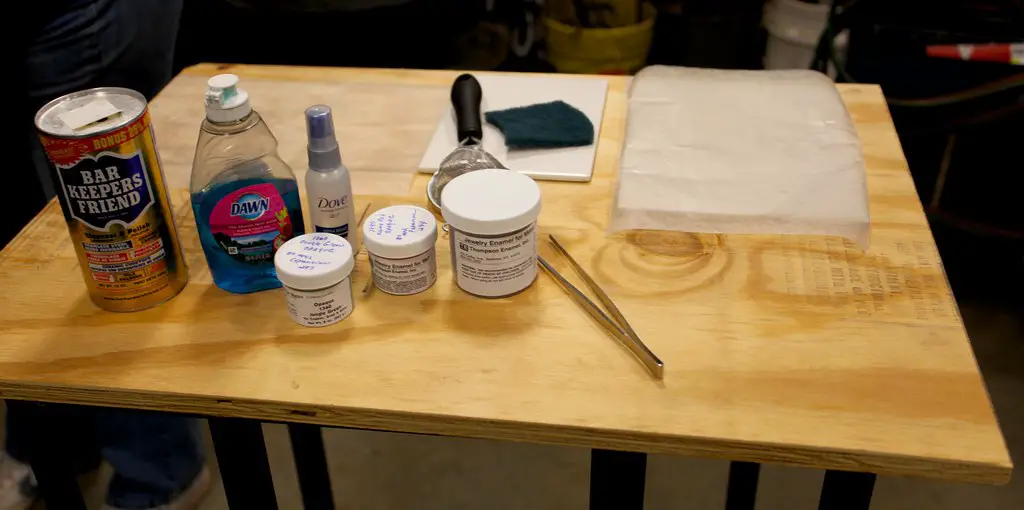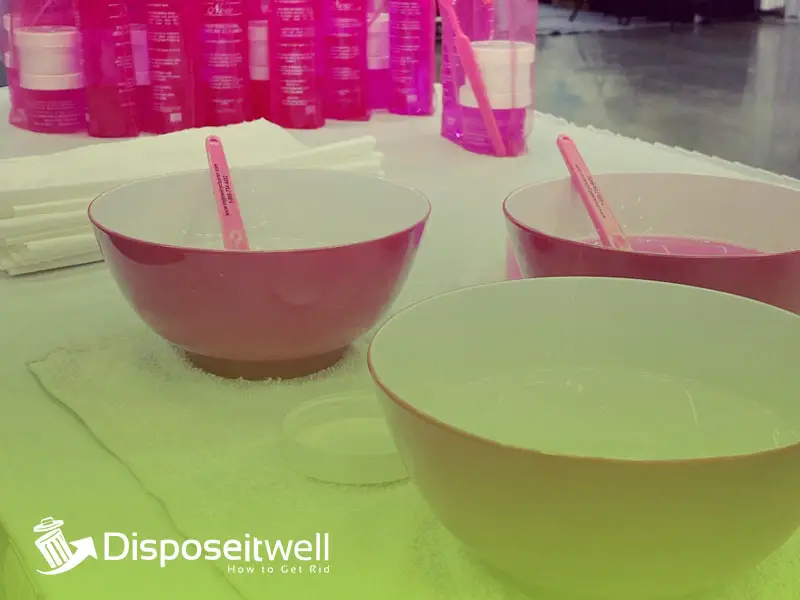When it comes to jewelry, we all want it to look its finest. Whether it’s a special piece that’s been passed down for generations or a brand new piece that we just can’t wait to show off, we want it to shine. That’s where jewelry cleaner comes in. But what to do once you’re done using it?
I remember when I first started getting into jewelry. I would go to the store and buy the cheapest jewelry cleaner I could find. I had no idea how to dispose of it properly and would just pour it down the drain. I had no idea that I was supposed to be diluting it first! If you’ve ever used jewelry cleaner, you know that it’s really strong stuff. It can eat through metals and stones, so imagine what it does to your pipes.
If you’re like me, you probably just pour it down the drain. But did you know that jewelry cleaner is actually really bad for the environment? It contains chemicals that can pollute our water supply and harm wildlife.
So what’s the proper way to dispose of jewelry cleaner? By doing some research I learned that there are several ways to dispose of jewelry cleaner. And the most effective way is to take it to a special recycling center that accepts chemicals. You can usually find these centers at hardware stores or home improvement stores.
In this blog post, I’ll let you know each and every way in detail what I learned during the research and implementation of these methods so let’s start!
How To Dispose Of Jewelry Cleaner?

If you’re like most people, you probably have a drawer (or box, or even a whole closet) full of old jewelry and its cleaners that you never use. Maybe you’ve upgraded to a new jewelry cleaner, or you no longer wear the type of jewelry that requires cleaning. Whatever the reason, if you’re not using it, why keep it around? Here’s a quick and easy guide on how to dispose of your old jewelry cleaner.
1. Check the Label
The first thing you need to do is check the label on your jewelry cleaner. Many cleaners will have specific instructions on how to dispose of them. If your cleaner doesn’t have any instructions, move on to step two.
2. Pour It Down the Drain
If your cleaner is non-toxic and won’t harm your plumbing, the easiest way to get rid of it is to flush it down the drain. You can also pour it into a bucket and then pour it down the drain outside.
Over time, when I started to research how to properly take care of my jewelry and clean it safely. I learned that you should always dilute jewelry cleaner before disposing of it.
You can do this by adding water to the cleaner until it’s about half and half. Then, you can pour it down the drain. The dilution will help to protect your pipes from the corrosive cleaner.
Also, just make sure you don’t pour it onto the ground, as this can damage vegetation and the ground itself.
3. Take It to a Hazardous Waste Facility
If your jewelry cleaner is toxic or harmful in some way, you’ll need to take it to a hazardous waste disposal facility. You can locate your nearest facility by visiting Earth911.com and entering your zip code. Once you find a facility near you, give them a call and find out what their procedures are for disposing of hazardous waste.
4. Recycle The Bottle
Once you’ve disposed of the actual jewelry cleaner, you can recycle the bottle if it’s made of glass or plastic. If the bottle is made of metal, you’ll need to throw it away in the regular trash.
To sum up, getting rid of your old jewelry cleaner is easy! Just check the label for specific instructions, then pour it down the drain or dispose of it responsibly. Don’t forget to recycle the bottle when you’re done!
Jewelry cleaner may seem like a small thing, but disposing of it properly can make a big difference for our planet.
Now that you know how to dispose of jewelry cleaner, you can keep your jewelry looking beautiful for years to come!
Is Jewelry Cleaner Toxic?
There is no straightforward answer to this question as it depends on the specific ingredients used in the jewelry cleaner. Some cleaners may contain harsh chemicals that can be toxic if ingested or if they come into contact with your skin.
However, there are also jewelry cleaners made with natural and non-toxic ingredients at home, such as baking soda and lemon juice.
Generally, commercial cleaners can cause allergies and extensive damage if ingested. It is imperative to always follow the instructions on the package and keep jewelry cleaners out of reach of children and pets.
It is also advisable to wear gloves or protective eyewear when using jewelry cleaner, as some chemicals can cause irritation or burns on the skin or eye contact.
Can we drain down the jewelry cleaner?
Unfortunately, draining jewelry cleaner is not recommended as it can potentially harm the environment. It is advisable to dispose of the jewelry cleaner according to the instructions on the label or by contacting your local waste management department for proper disposal methods.
But depending on the ingredients in your particular jewelry cleaner, there are a few different ways you can dispose of it.
If your jewelry cleaner is water-based, then you can pour it down the drain with plenty of water to dilute it. You should still contact your local waste disposal company to find out if there are any special instructions for disposing of water-based cleaners in your area.
For petroleum-based jewelry cleaners, you need to take a little extra care when disposing of them. Pour the petroleum-based cleaner into an empty container like an old coffee can and seal it shut. Once it’s sealed, you can put it in the trash.
Again, you should check with your local waste disposal company to find out if there are any special instructions for disposing of petroleum-based cleaners in your area.
Alternatives to Jewelry Cleaner
Here are some other alternatives to jewelry cleaning products:
1. Toothpaste
2. Baking soda and water paste
3. White vinegar and water solution
4. Mild hand soap and warm water
5. Club soda
6. Lemon juice and olive oil mixture
7. Commercial silver polish or gold polish
8. Jewelry cleaning cloths or wipes
9. Ultrasonic jewelry cleaner
10. Professional jewelry cleaning and maintenance service.
Household Items for jewelry cleaning
1. Rubbing Alcohol
If you don’t have jewelry cleaners, there are other ways to keep your jewelry clean. You can use a mild soap and water solution, or you can use rubbing alcohol.
Rubbing alcohol will kill any bacteria that might be on your jewelry, and it evaporates quickly so it won’t damage your jewelry. Just be sure to rinse your jewelry well after cleaning it with rubbing alcohol.
2. Mild soap and dishwashing liquid
- Toothbrush
- A soft cloth or cotton swab
- Mild soap or dishwashing liquid
Step 1: Mix a small amount of soap with warm water in a bowl or cup.
Step 2: Dip the toothbrush or cloth into the soapy water and gently scrub the jewelry, paying attention to any tough spots or buildup.
Step 3: Rinse the jewelry under warm running water and dry it with a soft cloth.
Step 4: For extra shine, buff the jewelry with a drop of olive oil or glass cleaner on a cloth.
Step 5: Always remember to remove jewelry before showering, swimming, or cleaning to avoid damage and excessive buildup.
FAQs
Do Jewelry Cleaners Contain Cyanide?
Yes some of them do as it depends on the specific jewelry cleaner being used. Some cleaners may contain small traces of cyanide compounds, while others may not contain any at all. It is critical to carefully read the labels as well as research the ingredients in a jewelry cleaner before using it.
Can apple cider vinegar clean gold?
There is no scientific evidence to suggest that apple cider vinegar can clean gold. However, some people swear by using it as a homemade jewelry cleaner. To try it, mix equal parts apple cider vinegar and water and soak the gold for several minutes before scrubbing with a soft toothbrush.
Remember to rinse and dry thoroughly before wearing. As with any jewelry cleaner, it is always advisable to spot-test in an inconspicuous area before using the entire piece.
Can I Leave my Ring in the Jewelry Cleaner Overnight?
Yes, you can, but it is not recommended to leave your ring in the jewelry cleaner overnight with bleach-containing cleaners. While ammonia-based cleaners may be effective at removing dirt and grime, they can also damage the metal setting or loosen stones over time if left in for days.
How do I Clean my pearl necklace?
Step 1: To clean your pearl necklace, start by wiping the pearls with a soft cloth to remove any dirt or debris.
Step 2: Next, mix warm water with a small amount of mild soap and gently scrub the pearls with a soft toothbrush.
Step 3: Rinse the pearls thoroughly in clean water and pat dry with a soft cloth. Avoid using harsh chemicals or soaking the pearls in water for extended periods of time.
You can also bring your pearl necklace to a professional jewelry cleaner for a more thorough cleaning.
Verdict
We hope this article was helpful in teaching you how to dispose of your jewelry cleaner safely! Don’t hesitate to contact your local waste disposal company for specific instructions in your area if you are uncertain. And now that you know how to properly dispose of your jewelry cleaner, happy cleaning!
Thanks for Reading!
My name is Ella Vicedomine and I’m the founder of this blog. The aim is to start this informational blog to guide people on how to dispose of waste things around in the house but in the right way.

